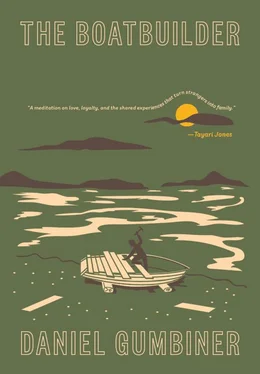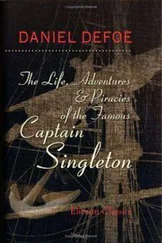Berg had not been struck by the boom itself, they all agreed after the fact. If he’d been struck by the boom, he would have been in the water and probably knocked out. And he hadn’t been knocked out. He had never lost consciousness. He’d stumbled backward, dazed, and then continued to help Woody furl the jib. Only afterward did he realize how out of it he was. He tried to do some arithmetic in his brain but he felt slow. The water looked strange to him, chaotic in its movements, extra reflective. He must have been struck by the block or the mainsheet, they concluded.
“I’m so sorry,” Woody said, once they’d docked and the client had left.
“It’s okay, Woody,” Berg said.
“Are we going to report this to Mangini?” Garrett said. He was nervous, pacing the galley, clearly afraid that reporting the incident might endanger his job.
“I don’t know,” Berg said.
“If we’re going to report it, we need to report it now.”
“I’d say let’s report it,” Woody said.
“Berg’s going to decide,” Garrett said. Berg looked at the floor. He felt unable to process what had just happened.
“Let’s wait until tomorrow,” he said. “I’ll see how I feel tomorrow.”
IN THE MORNING, WHEN he woke up with blinding headaches, he knew he’d suffered another concussion. It was not as bad as the first one but it was certainly a concussion. Uffa and Demeter drove him to the hospital in Santa Rita, where they took an X-ray of his brain to make sure that he wasn’t bleeding internally and then sent him home with a pamphlet about concussions.
Later that afternoon he called Garrett and told him about the concussion. He said he was going to take a week off, that he’d call Mangini to let him know.
“No, no,” Garrett said. “Let me talk to Mangini first.”
Mangini called Berg fifteen minutes later and told him to take his time recovering. Berg was immediately suspicious: his words sounded inauthentic and forced, as if he were reading them from a teleprompter. Was he just afraid that Berg was going to sue them? He had never trusted Mangini. Nobody trusted Mangini. Berg wondered what Garrett had said to him, why he felt the need to speak to him first.
“The important thing is that we learn from this,” Mangini said. “This is a good wake-up call for all of us.”
Nell came up to stay with Berg and he spent the next few days in bed, taking ibuprofen and acetaminophen to ward off headaches, with little success. Alejandro and Rebecca let Berg and Nell stay in the guest room in the farmhouse so Berg wouldn’t be disturbed by noise from the shop. It was the only spare room in the house and it was simple, unadorned. A small bookshelf and, opposite the bed, a window looking out on the grove of laurels and cedars.
Berg slept and listened to a book on tape about World War II. After three days of rest, he went back to work, for both Alejandro and Mangini. On his first day back, Mangini gave him a weird lecture in which he basically told Berg that the incident was his fault, that he shouldn’t have been standing where he was standing, and that he needed to do more sailing training if he wanted to remain at Fernwood.
“We just can’t have this happening on charters,” Mangini said. “I’ve been working on the bay for thirty years and this is the most serious accident I’ve ever been associated with. We’ve lost trust in you, so you’re going to have to earn it back. But I’m glad you’re healthy,” he added. “You feeling all better?”
“I’m getting some headaches but it’s okay.”
“Yeah, man, I got smacked in the head all the time when I was younger. You just gotta tough it out. You’ll be fine.”
It seemed like Mangini had been stewing about the incident for the past three days, demonizing Berg in his absence. Berg was infuriated. The accident had not been his fault. He was not faultless, he shouldn’t have been standing there, but there was plenty of blame to go around: Garrett should have never tried to furl the jib in that kind of weather, Woody should have had the line around a cleat, and Garrett shouldn’t have accidentally jibed. Still, Berg knew he was lower on the totem pole than Garrett, and he didn’t feel like throwing Woody under the bus. He said nothing to Mangini, nodded silently, and then walked down to the docks to prep the boat.
The next two weeks were miserable. The headaches were back and more forceful than ever. They short-circuited his thoughts and they made his whole body feel tense and sensitive, like he’d been drinking a lot of caffeine and not getting any sleep. On occasion, his ears would begin to ring, seemingly at random. He told Alejandro he wasn’t doing so well and Alejandro told him he should take more time off.
He did take more time off and felt a little better, but when he went back to work, the headaches returned in full force. He decided he needed to go see another doctor. He had not been inspired to do this earlier, because the specialists he’d seen the first time around had not been helpful. This doctor was no different. He told Berg that there was nothing to do except wait. It was normal to have these kinds of headaches after a concussion, he said, and eventually they would diminish in frequency and intensity.
“Should I be working?” Berg asked.
“It’s been what? Over a month?” the doctor said.
“Yeah.”
“I don’t see why not. You can’t make the concussion symptoms worse at this point,” he said. “Just make sure you don’t get another one.”
So Berg continued to work. But the work he was doing was very poor. They were building out the frames for a skiff for the Moltisanti family, and Berg was helping Alejandro make the cuts on the big green bandsaw. Cutting frames was difficult because they had to be cut on a rolling bevel. Berg’s job was to push the wood through the saw while Alejandro stood above it, adjusting the bevel as they went. Shortly after they’d started, Berg produced a few unsatisfactory cuts that would have to be fixed with hand tools. He was frustrated because he knew how to do this. It was embarrassing to mess up right in front of Alejandro. Oftentimes, when he made mistakes in the shop, he was allowed to make them in private, and then correct them before he presented the work to Alejandro. But with this work, his teacher was right there, observing.
“It’s okay,” Alejandro said. “You’re not trying to show who you are, you’re just trying to make the thing.”
Berg nodded. He looked around for Uffa and then remembered that he’d gone over to the farmhouse to begin cooking dinner. Like a college co-op, the family meal was prepared by a different person every night, according to a monthly schedule devised by Rebecca.
“We’re just trying to merge with the task at hand,” Alejandro said. “That’s the best you can do. It’s like cooking a meal or walking in a field.”
Berg took a deep breath and lifted up the next piece of wood. He’d had a headache all day but it had grown more painful as the day wore on. The more he messed up the cuts, the worse it seemed to get. Right now it was burning white and sharp.
“Are you sure you’re okay to do this?” Alejandro asked.
“Yes,” he said.
Alejandro watched him for a moment, and then he said, “No.” There was a serious look on his face. “No,” he said. “C’mon. Here, put this down.” He waved at the piece of wood Berg was holding. Berg rested it against the bandsaw.
Alejandro led him out of the shop, through the pasture, and into the oak meadow east of the house. They walked for a while until they came to a smooth log. Alejandro sat down on the log and invited Berg to do the same. A soft wind passed through the meadow, carrying with it smells of the distant woods: moist dirt and fir and creek water. Alejandro took a deep breath and then closed his eyes.
Читать дальше












